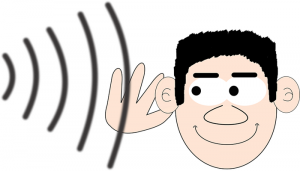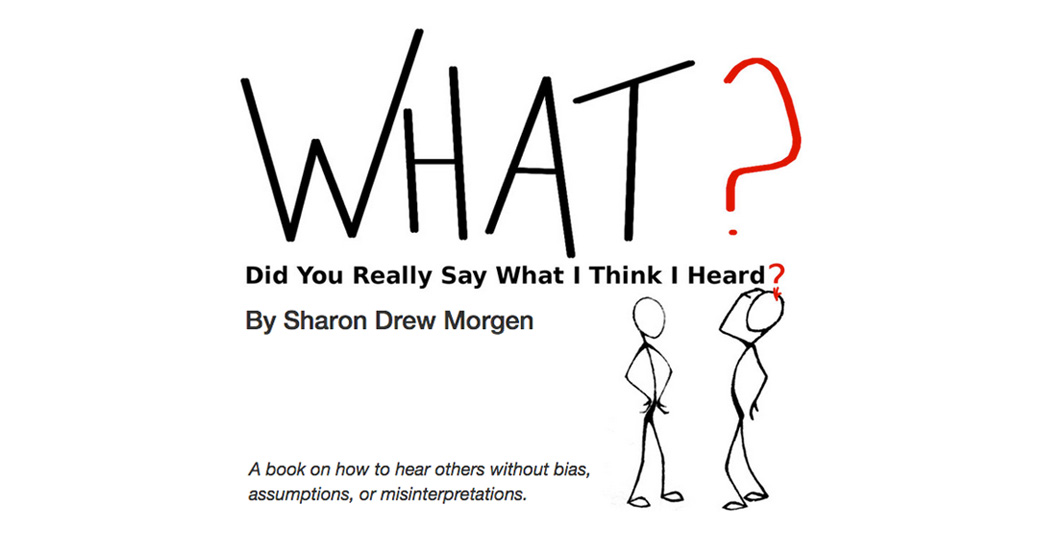Unconscious Listening Biases: how influencers unwittingly restrict possibilities, by Sharon-Drew Morgen
 Do you enter conversations to listen for what will confirm your assumptions? Do you assume the responses to your questions provide an accurate representation of the full fact pattern from which to base follow-on questions? Do you assume your history of similar topics topics gives you a more elevated understanding of what your Communication Partners (CPs) mean?
Do you enter conversations to listen for what will confirm your assumptions? Do you assume the responses to your questions provide an accurate representation of the full fact pattern from which to base follow-on questions? Do you assume your history of similar topics topics gives you a more elevated understanding of what your Communication Partners (CPs) mean?
If any of the above are true, you’re biasing your conversation. By entering conversations with assumptions and personal goals, and listening through your historic, unconscious filters, you unwittingly direct conversations to what you expect to hear and may miss a more optimal outcome. But it’s not your fault.
OUR BRAINS BIAS WHAT WE HEAR
The most surprising takeaway from my year of research for my book (What? Did you really say what I think I heard?) on closing the gap between what’s said and what’s heard was learning how little of what we think we hear is unbiased, or even accurate. Indeed, it’s pretty rare for us to hear precisely what another intends us to hear: our brains don’t allow us to.
Our brains listen through our existing neural circuitry, reducing our ability to accurately translate what’s been said to what we already know, leaving us unaware there might be a misunderstanding regardless of how carefully we listen.
Here’s a simplified explanation of how brains listen. Sound actually enters our ears as meaningless sound vibrations which become electrochemical signals that are dispatched to a similar-enough synapse. Unfortunately, whatever doesn’t match exactly gets deleted. We’re left assuming that what we think we’ve ‘heard’ is accurate even though there’s a good chance it’s not.
So your CP might say ABC and your brain tells you they said ABL without even mentioning it omitted D, E, F, etc. I once lost a business partner because he ‘heard’ me say X when three of us confirmed I said Y. “I was right here! Why are you all lying to me! I KNOW she said that!” And he walked out in a self-generated rage. This makes it tough for any communication where mutual understanding is so important.
Indeed, as outsiders – as sellers, leaders, or influencers of any kind – with different beliefs/values, backgrounds, etc., and entering conversations with our own goals and unconscious biases, we end up unintentionally misunderstanding, mistranslating, or mishearing, but believe what we think we’ve heard is true. In other words, our natural inability to hear accurately causes us miscommunication and flawed understanding. Not to mention lost business and lost relationships.
Net net, we unwittingly base our conversation, questions, and intuitive responses on an assumption of what we think has been said, and succeed only with those whose biases match our own. [Note: for those who want to manage this problem, I’ve developed a work-around in Chapter 6 of What?)
ENTERING CONVERSATIONS WITHOUT BIAS
I want to go back to the problems incurred by entering conversations with personal biases:
- by biasing the framework of the conversation to the goals we wish to achieve, we overlook alternative, congruent outcomes. Sellers, coaches, leaders, and managers often enter conversations with personal expectations and goals rather than collaboratively setting a viable frame and together discovering possibility.
- by listening only for what we’re (consciously or unconsciously) focused on hearing, we overlook a broader range of possible outcomes. Sellers, negotiators, leaders, help desk professionals, and coaches often miss real opportunities to promote agreement and discovery.
Here are some ideas to help you create conversations that avoid restriction:
- As an influencer, shift your goal from information gathering (for you) to facilitating the route to change (for them).
- Enter each conversation with a willingness to serve the greater good within the bounds of what you have to offer, rather than meet a specific outcome. Any expectations or goals limit outcomes.
- Enter with a blank brain, as a neutral navigator, servant leader, change facilitator.
- Trust that your CP has her own answers. Your job is to help her find them, as they are often unconscious. This is particularly hard for influencers who believe they have ‘the answers’. (And yes, all influencers, sellers, leaders, negotiators, and coaches are guilty of this.) I’ve written an article to specifically address this.
- Your biased questions will only extract biased answers. Use questions that make their journey to discovery more efficient, like “What has stopped you from making the change before now?”. [Note: I’ve developed Facilitative Questions that lead folks through their unconscious thinking patterns.]
- Enable Others to discover their own route to Excellence rather than attempt to influence a specific behavior you might deem important.
- Get rid of your ego, your need to be right or smart or have the answers. Until your CP finds a way to recognize their own unconscious issues, and design congruent change that matches their idiosyncratic ‘givens’, you aren’t helpful regardless of how much you know.
By listening with an ear that hears avenues to serve, to understand what’s been said without unconscious bias, you can truly serve your Communication Partner.
____________
Sharon-Drew Morgen is a breakthrough innovator and original thinker, having developed new paradigms in sales (inventor Buying Facilitation®, listening/communication (What? Did you really say what I think I heard?), change management (The How of Change™), coaching, and leadership. She is the author of several books, including her new book HOW? Generating new neural circuits for learning, behavior change and decision making, the NYTimes Business Bestseller Selling with Integrity and Dirty Little Secrets: why buyers can’t buy and sellers can’t sell). Sharon-Drew coaches and consults with companies seeking out of the box remedies for congruent, servant-leader-based change in leadership, healthcare, and sales. Her award-winning blog carries original articles with new thinking, weekly. www.sharon-drew.com She can be reached at sharondrew@sharondrewmorgen.com.
Sharon Drew Morgen August 4th, 2025
Posted In: Listening


